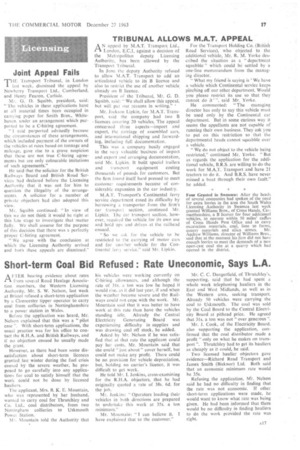Short-term Coal Bid Refused : Rate Uneconomic, Says L.A.
Page 19

If you've noticed an error in this article please click here to report it so we can fix it.
AFiTER hearing evidence about rates from several Road Haulage Association members, the Western Licensing Authority, Mr. S. W. Nelson, last week at Bristol refused a short-term application by a Cirencester tipper operator to carry coal from collieries in Nottinghamshire to a power station in Wales.
Before the application was heard, Mr. Nelson explained that this was a "pilot case ". With short-term applications, the usual practice was for his office to contact the R.H.A. and British Railways, and if no objection ensued he usually made the grant.
However, as there had been some dissatisfaction about short-term licences granted, last winter during the fuel crisis caused by the severe weather, he proposed to go carefully into any applications for coal to satisfy himself that the work could not be done by licensed hauliers.
The applicant, Mrs. B. K. E. Mountain, who was represented by her husband, wanted to carry coal for Thrutchley and Co. Ltd., coal distributors, from two Nottingham collieries to Uskmouth Power Station.
Mountain told the Authority that
his vehicles were working currently on C-hiring allowances, and although the rate of 31s. a ton was low he hoped it would rise, as it did last year, if and when the weather became severe and the Railways could not cope with the work. Mr. Mountain said that it was better to have work at this rate than have the vehicles standing idle. Already the Central Electricity Generating Board was experiencing difficulty in supplies and was drawing coal off stock, he added.
Asked by Mr. Nelson if he was satisfied that at that rate the applicant could pay her costs, Mr. Mountain said that she could "just about" cover herself, but could not make any profit. There could be no provision for vehicle depreciation, but, holding no carrier's licence, it was difficult to act work.
He told Mr. I. Jenkins, cross-examining for the R.H.A. objectors, that be had originally quoted a rate of 38s. 6d. for the job.
Mr. Jenkins: " Operators loading their vehicles in both directions are prepared to undertake this work at 35s. a ton minimum."
Mr. Mountain: "I can believe it. I have explained that to the customer." Mr. C. C. Dangerfield, of Thrutchley's, supporting, said that he had spent a whole week telephoning hauliers in the East and West Midlands, as well as in the Western area, seeking transport. Already 50 vehicles were carrying the coal to Uskmouth. The coal was sold by the Coal Board to the Central Electricity Board at pithead price. He agreed that 31s. a ton was not "over generous ".
Mr. J. Cook, of the Electricity Board, also supporting the application, confirmed that the coal distributor made a profit "only on what he makes on transport". Thrutchtey had to get its hauliers as cheaply as it could, he said.
Two licensed haulier objectors gave evidence—Richard Read Transport and James Smith (Bicknor) Ltd. Both said that an economic minimum rate would be 35s.
Refusing the application, Mr. Nelson said he had no difficulty in finding that the rate was not economic. If other short-term applications were made, he would want to know what rate was being given. He had been informed that there would be no difficulty in finding hauliers to do the work provided the rate was right.
















































































